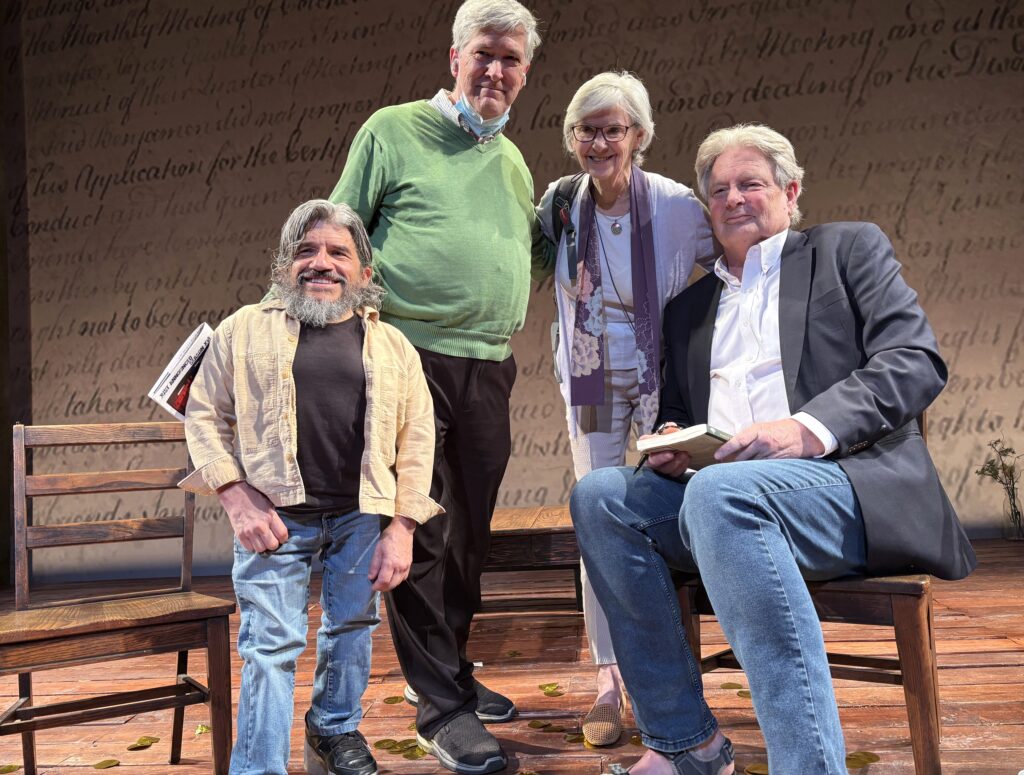Opening night for The Return of Benjamin Lay in Philadelphia was fabulous!
Photo: Mark Povinelli with Vance Lehmkuhl (who offered a forum for Radnor Friends last March titled A Wider Circle of Care: The Visionary Ecology of Early Quaker Abolitionists), Suzanne McAllister, and Marcus Rediker on Thursday 1 May 2025.
Our field trip group enjoyed vegan soul food at the Nile Cafe before the show. Jai A., who recently completed the Benjamin Lay Fellowship, was in the group. Author-historian and co-playwright Marcus Rediker stopped by and gave us an intro, setting our mental stages for what we were about to experience.
Actor Mark Povinelli, whose mesmerizing rendition of the 18th-century Quaker Benjamin Lay spanned 70 minutes, although it felt like just 20, got a standing ovation—and then another one during the post-performance talkback. To play the role of Benjamin was to reintroduce one of history’s striking movement allies. As Marcus Rediker says,
“I want to make it very clear from the outset that in my view, enslaved people are always the first abolitionists. In the course of their struggle, they acquire allies. They had a very important ally in Benjamin Lay but the proximity that he had to that struggle in Barbados from 1718 to 1720 was really the turning point in his life. I want to foreground the cycle of rebellion. That in a way is what made Benjamin Lay an abolitionist.”
From the audience, Darlyne B. sensed the emergence of Benjamin’s abolitionist spirit in that turning point: the horror of slavery, and the way Benjamin responded to an enslaved friend’s grotesque plight, including torture and eventual suicide. Benjamin had to face reality: the promising story of Penn’s Woods (where half the Quakers owned human beings) had been betrayed by its own visionaries. Benjamin went to Philadelphia to give voice to the great levelling truth.
Benjamin would become an outcast. Benjamin would also become a catalyst. The Quakers ensured that Pennsylvania was among the first jurisdictions to outlaw slavery. In the talkback period, Darlyne expressed having vividly imagined the hue of Mark Povinelli’s skin deepening as the journey played out onstage. Mark and Darlyne expressed a sense together of communicating “from the margins” about the radical potential in Quakers and in all of us.
What’s also filtering up to everyone who encounters Marcus Rediker’s work is how Benjamin and life partner Sarah (Smith) Lay considered all animal beings co-workers on the planet. They were not to be harmed, not to be consumed. Benjamin and Sarah grew their own food and fabric. They would not ride horses or shear sheep, which made them standout rebels on an additional level. To Benjamin and Sarah, respect for other living, sentient beings was a matter of answering the divine in all living communities—no borderlines. A matter of empathy. A matter of allyship.
Marcus told us (at dinner and in the talkback period) how writing The Fearless Benjamin Lay would serve as an appeal to Quakers to take Benjamin back. Ultimately, Abington Monthly Meeting’s minute on Benjamin Lay recognized Benjamin as “a Friend of the Truth.” Philadelphia Yearly Meeting acknowledged that this was “in unity with the spirit of our Philadelphia Yearly Meeting.”
Renowned playwright Naomi Wallace was convinced by the power of the continuing journey, and Marcus Rediker’s vow to never let Benjamin fall back into obscurity. Our Meeting became part of this wonderful journey on May 1, 2025. That night, Marcus and Mark told us the key was not so much allowing Benjamin to rejoin Quaker society—it’s more important, now, for Quakers to join Benjamin.
This completely unique dramatic production is doing the serious work of making the domination paradigm visible, across time and across social groups, connecting disability rights activists, animal liberationists, Quakers, and the global reparations movement. This is not easy work. But Marcus and Mark provide outstanding role models.
The Return of Benjamin Lay is sustenance for all who reprehend injustice. Recently, more is being said about the human potential to celebrate diversity, achieve social equity, inspire eco-awareness, and move into a deep, empathy-guided fairness. Especially in light of the death of Pope Francis. Benjamin tells us there’s no set rule that the spirit has to be docile.
And Mark Povinelli was clear about the difficulty at first of accepting the role: “I knew that I’d not just be presenting Benjamin’s story, but embodying it.”
This, it seems to me, is integrity.

